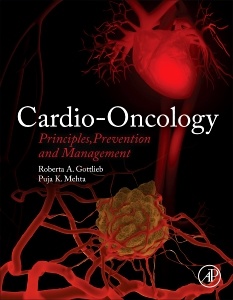Description
Cardio-Oncology
Principles, Prevention and Management
Authors: Gottlieb Roberta A., Mehta Puja K
Language: English
Subjects for Cardio-Oncology:
174.92 €
In Print (Delivery period: 14 days).
Add to cart356 p. · 21.4x27.6 cm · Hardback
Description
/li>Contents
/li>Biography
/li>Comment
/li>
Cardio-Oncology: Principles, Prevention and Management is a clinical volume that focuses on the basic science of cardio-oncology, addresses cardiotoxicity as a consequence of cancer therapy, and discusses prevention, diagnosis and management of cardiovascular disease in patients with cancer.
This comprehensive volume presents unique perspectives ranging from basic science to clinical medicine in the field of cardio-oncology. It would be a valuable resource for cardiologists, oncologists, internists, and pediatricians caring for patients with cancer who have cardiovascular risk factors, as well as for cardio-oncology researchers.
Basic Concepts1. Current trends in cancer therapyMonica Mita2. Molecular Mechanisms Underlying Anthracycline Cardiotoxicity:Challenges in Cardio-OncologyLorrie Kirshenbaum3. Chemotherapy and cardiovascular biologyPaul A. Cahill4. AnthracyclinesEdward T H Yeh and Rohit Moudgil 5. Kinase inhibitors, ErbBs, VEGFAntonio Russo
Recognition and Management 6. Role of novel imaging techniques in detection of chemotoxicity: cardiac MRI and nuclearLouise Elizabeth Jane Thomson7. Role of biomarkers in detecting cardiotoxicity (highly sensitive troponin, BNP)Daniela Cardinale8. Ischemic heart disease as a consequence of cancer therapyJoseph Carver9. Radiation and vascular complications (thrombosis, carotid atherosclerosis for head/neck cancer, Hodgkin’s lymphoma) [include valve and pericardium]Stephen Shiao10. Identification of at-risk patients and comorbidities that increase riskTochukwu Okwuosa11. Special considerations in pediatric patients and survivors of childhood cancerSteven Lipshultz and Vivian Franco 12. Special considerations of pre-mature menopause in women as a consequence of chemotherapyChrisandra Shufelt13. Cancer and ExerciseAhmed Al Badri14. Statin usage in cardio-oncology patientsSusmita Parashar15. Coordinating cardio-oncology careSusan Dent16. Role of coronary calcium, hs-CRP, ABIJanet Wei17. Hypertension and cancerAntoine Hage18. Pulmonary Hypertension and CancerAntoine Hage19. Detection of Cardiotoxicity by EchocardiographyStamatios Lerakis20. Cancer fatigue/chemo brain, rehabilitation and quality of life Arash Asher
Managing the patient in advanced HF21. Management of advanced HF and transplant considerations in cancer patientsMichele A. Hamilton22. Heart transplant and LVADs in cancer survivors (role of immunosuppression in transplant patients)Michelle M. Kittleson23. QT prolongation, EP Devices to support the failing heart (ICDs, BiVs, Pacemakers) Mikhael El-Chami
The work in her lab has led to the discovery of the cardioprotective agents and the elucidation of their novel mechanism of action. Her expertise in cardioprotection and autophagy is recognized on a national and international level.
Dr. Gottlieb is also an entrepreneur, having started a biotechnology company called Radical Therapeutix, to develop drugs to mitigate the damage to the heart during myocardial infarction. Dr. Gottlieb received her B.S. and M.D. degrees from Johns Hopkins University.
Dr. Mehta, MD, FACC is Director of the Non-invasive Vascular Function Research Laboratory in the Barbra Streisand Women's Heart Center at the Cedars-Sinai's Heart Institute. She is also Co-Director of the Cardio-Oncology Program, a clinic dedicated to the heart health of women after cancer treatment.
Dr. Mehta is board certified in internal medicine and cardiovascular diseases and board-eligible in echocardiography and nuclear cardiology. She is a member of the American Heart Association, the American Society for Preventive Cardiology and the American College of Cardiology, where she is also a fellow. In addition to academic success, she has received numerous awards including the prestigious New Jersey Foundation Humanism in Medicine Award. She has published her research in peer-reviewed journals and presented at national cardiology meetings. Dr. Mehta's research is National Institutes of Health (NIH) funded and includes the role of mental stress in heart disease, exploring the brain-heart connection and new approaches to treating chest pain in women.
Dr. Mehta’s Scival Overall Research Performance 2009-2013: 30 Publications, 24
- Covers basic science of cardio-oncology to provide readers with the necessary background
- Addresses cardiotoxicity related to current cancer therapeutic modalities
- Discusses diagnostic and management approaches of patients with underlying cardiac risk factors as well as otherwise healthy cancer patients
These books may interest you

Practical Cardio-Oncology 208.65 €

Practical Cardio-Oncology 123.78 €

Clinical Cardio-oncology 167.27 €

